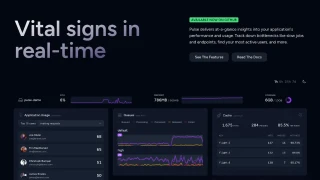- / Contents
- / How Artificial Intelligence is Revolutionizing Software Testing

How Artificial Intelligence is Revolutionizing Software Testing
AI is revolutionizing software testing by automating processes, enhancing accuracy, and enabling predictive analytics, transforming everything from test planning to execution, monitoring, and reporting, resulting in faster, smarter, and more efficient testing practices.
We're witnessing a game-changing shift in software testing, and it's all thanks to artificial intelligence. As someone deeply passionate about tech advancements, I'm thrilled to see how AI is reshaping how we ensure software quality. It's not just about making things faster; AI is bringing a whole new level of smarts to the testing process, helping us catch bugs we might have missed before and giving us insights we never thought possible.
In this article, we'll dive into the exciting world of AI in software testing. We'll explore how it's changing how we plan and design tests, making test execution and monitoring more efficient, and transforming how we report and analyze results. From machine learning algorithms that predict where bugs are likely to hide, to AI-powered visual testing tools that spot even the tiniest UI glitches, we will uncover the cutting-edge ways artificial intelligence is revolutionizing software testing. Get ready to be amazed by the potential of AI testing tools and how they're set to change the game for developers and testers alike.
Revolutionizing Test Planning and Design
I'm excited to dive into how artificial intelligence is transforming the way we approach test planning and design. It's truly amazing to see how AI is reshaping these crucial aspects of software testing, bringing a new level of efficiency and effectiveness to our work.
AI-Assisted Test Strategy Formulation
AI is changing the game when it comes to creating solid test strategies. We're now able to craft customized test plans that cover all the intricate details of our projects, from the environment to product elements and quality criteria. What's cool is how AI helps us analyze requirements, user stories, and code to automatically generate test cases. This means we're getting comprehensive test coverage without breaking a sweat.
But here's the thing – AI isn't just about automation. It's also about prediction. By leveraging machine learning algorithms, we can now predict where failures are most likely to occur. This insight is invaluable as it ensures we're thoroughly testing the most critical areas of our applications.
Intelligent Test Case Prioritization
One of the most exciting developments I've seen is AI-driven test prioritization. It's revolutionizing how we decide which test cases to run first. By analyzing vast amounts of data, including historical test results and code changes, AI can identify which test cases are most likely to fail. This means we're focusing our efforts where they're needed most, saving time and resources.
What's more, this intelligent prioritization is speeding up our feedback loop to developers. We're catching and fixing issues faster than ever before. It's not just about speed, though. AI is also helping us identify dependencies between test cases, ensuring we're getting comprehensive test coverage.
Automated Test Data Generation
Generating the right test data has always been a challenge, but AI is making this process so much easier. We're now using AI and machine learning models to create realistic and varied test data that mimics real-world scenarios. It's like having a test data chef who knows exactly what ingredients we need for our testing recipe!
However, it's important to note that while AI-generated test data is incredibly useful, it's not without its challenges. We need to be aware of potential issues like overfitting or underfitting during model training, which could lead to unrealistic data. Also, when dealing with personal data, we need to be mindful of GDPR regulations. Despite these challenges, the benefits of AI in test planning and design are undeniable. It's helping us create more robust, efficient, and effective testing strategies. I'm thrilled to see how this technology will continue to evolve and enhance our testing processes in the future.
AI in Test Execution and Monitoring
I'm thrilled to dive into how AI is transforming test execution and monitoring. It's amazing to see the advancements in this field, and I can't wait to share them with you.
Cognitive Test Execution Engines
We're seeing a revolution in test execution engines, and it's all thanks to AI. These engines are now supporting automation frameworks, which is a game-changer for us testers. We can now automate those repetitive, time-consuming test cases, freeing us up to focus on more complex tasks. What's really exciting is how these engines are leveraging AI and machine learning to optimize test case selection and identify patterns in test results.
One of the coolest features I've seen is the support for parallel and distributed test case execution. By using multiple machines or environments simultaneously, we're able to execute tests faster and scale up to accommodate large test suites. This is a huge time-saver, especially when we're dealing with complex applications.
Real-Time Defect Detection
AI is revolutionizing how we detect defects in real-time. We're now using deep learning models, especially Convolutional Neural Networks (CNNs), to identify intricate patterns and anomalies that are invisible to the human eye. It's like having a super-powered microscope that can spot the tiniest imperfections.
The process is fascinating. It starts with image acquisition, where the system captures real-time images of each product. Then, it goes through preprocessing, feature extraction, and finally, defect detection. What's really cool is that these AI systems can adapt and improve over time through machine learning, continually enhancing their ability to detect new or evolving types of defects.
Performance Testing with AI
AI is taking performance testing to a whole new level. We're now able to use machine learning algorithms to learn from previous user behavior and forecast future usage patterns. This means we can dynamically adjust virtual user load during performance tests, creating a more realistic representation of actual user traffic.
One of the most exciting developments I've seen is the use of AI for predictive analytics in performance testing. By analyzing historical data, AI models can forecast potential performance bottlenecks before they impact user experience. This proactive approach allows us to address issues early, reducing downtime and improving application robustness.
AI is also enabling self-healing tests that adapt to changes in the application or environment. This is a huge time-saver, as we no longer need to manually update scripts after each code change. The future of AI in test execution and monitoring looks bright, and I can't wait to see what other innovations are on the horizon.
Transforming Test Reporting and Analytics
I'm thrilled to share how AI is revolutionizing test reporting and analytics. It's incredible to see the advancements in this field, and I can't wait to dive into the details.
AI-Powered Test Result Interpretation
AI is transforming the way we interpret test results. By leveraging machine learning algorithms, we're now able to analyze vast volumes of data quickly and accurately. This not only speeds up the interpretation process but also minimizes the potential for human error. What's really exciting is how AI enhances the precision and consistency in results interpretation, making our lab results more trustworthy than ever before.
One of the coolest things I've seen is AI's ability to identify patterns, trends, and correlations that might slip past human analysis. This leads to more accurate interpretation of results, which ultimately improves patient care. Plus, AI facilitates real-time analysis and faster turnaround times, significantly reducing the waiting period for lab results.
Predictive Quality Insights
AI is taking quality assurance to a whole new level with predictive analytics. By analyzing historical data from previous releases, including metrics like defect density, severity, and customer feedback, AI algorithms can make accurate predictions about the quality of upcoming releases. This is a game-changer for project managers and QA teams.
What's really fascinating is how AI can forecast potential performance bottlenecks before they impact user experience. By considering factors such as historical defect patterns, code changes, and the likelihood of test case failure, AI models can intelligently rank and prioritize test cases. This proactive approach allows us to address issues early, reducing downtime and improving application robustness.
Automated Test Report Generation
AI is making test report generation a breeze. Generative AI has the unique ability to automate the creation of detailed defect reports, ensuring that every piece of vital information is delivered without manual effort. It's like having a super-smart assistant that never misses a detail.
What's more, AI takes a holistic approach to test maintenance. It seamlessly integrates various data sources, delving into visual aspects, scrutinizing underlying HTML code, and even comprehending human-readable content. This multidimensional perspective ensures our test cases remain relevant and up-to-date throughout the software development journey.
Embracing the AI Revolution in Software Testing
Artificial intelligence is reshaping the landscape of software testing in remarkable ways. By enhancing every phase—from planning and design to execution, monitoring, and reporting—AI is driving efficiency and precision. These innovations allow testers to concentrate on complex issues while AI handles routine tasks, resulting in quicker, more accurate testing.
The future of AI in software testing is bright, with ongoing advancements promising to tackle existing challenges and unlock new opportunities. As AI continues to evolve, it’s transforming both software quality and the role of testers, making this an exhilarating time in the field.
FAQs
1. How is Artificial Intelligence transforming various industries?
Artificial Intelligence (AI) is significantly transforming sectors like healthcare, finance, and manufacturing by improving efficiency and productivity. It's also reshaping the job market by necessitating new skills from the workforce.
2. What role does AI play in software testing?
AI in software testing involves using artificial intelligence technologies to improve and streamline the testing process. This includes automating tasks such as executing tests, validating data, and identifying errors to assess software’s capabilities, efficiency, and reliability.
3. How are AI and machine learning impacting software development?
AI and machine learning (ML) are revolutionizing software development by using algorithms to analyze code repositories, historical bug data, and developer interactions. These technologies help predict and prevent potential bugs by identifying patterns that may lead to issues, allowing developers to proactively address them before they impact the software.
4. In what ways is AI altering the landscape of software testing?
AI is transforming the landscape of software testing by enhancing test automation. It simplifies, accelerates, and increases the accuracy of software testing. AI-powered tools are capable of generating test cases, executing tests, and analyzing the outcomes automatically, thereby reducing manual effort and time.













